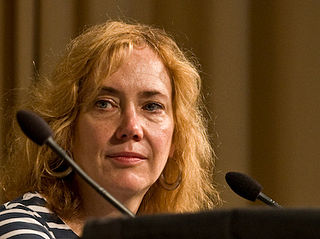A Quote by Eliezer Yudkowsky
He'd met other prodigies in mathematical competitions. In fact he'd been thoroughly trounced by competitors who probably spent literally all day practising maths problems and who'd never read a science-fiction book and who would burn out completely before puberty and never amount to anything in their future lives because they'd just practised known techniques instead of learning to think creatively.
Quote Topics
Related Quotes
I read one book where the characters never said anything; instead, they spent all their time grunting and bleating and hissing and cooing and growling and chirping and... It was like a menagerie in there. After a while, I wasn't even taking in the rest of the book, because that was all I could see: the dialogue tags.
I guess...on one hand, I spent way too much time watching science fiction and reading science fiction when I was growing up. But a part of it is I also never felt much of a connection to the world in which I lived while I was growing up, and so, oddly enough, I think I felt a lot more connected to the worlds that I read about in science fiction.
I've never written a fiction before about real people. . . . I read everything that I could find by people who met them and tried to get some impression of them, but as always when you write fiction, even if you have completely fictitious characters, you start by thinking of what is plausible, what would they say, what would they be likely to do, what would they be likely to think. At some point, if it is every going to come to life, the characters seem to take over and start speaking themselves, and it happened with [COPENHAGEN].
He had never been interested in stories at any age, and had never quite understood the basic concept. He'd never read a work of fiction all the way through. He did remember, as a small boy, being really annoyed at the depiction of Hickory Dickory Dock in a rag book of nursery rhymes because the clock in the drawing was completely wrong for the period.
It had also been my belief since I started writing fiction that science fiction is never really about the future. When science fiction is old, you can only read it as being pretty much about the moment in which it was written. But it seemed to me that the toolkit that science fiction had given me when I started working had become the toolkit of a kind of literary naturalism that could be applied to an inherently incredible present.
Science fiction, as I mentioned before, writes about what is neither impossible nor possible; the fact is that, when the question of possibility comes up in science fiction, the author can only reply that nobody knows. We haven't been there yet. We haven't discovered that yet. Science fiction hasn't happened.






































